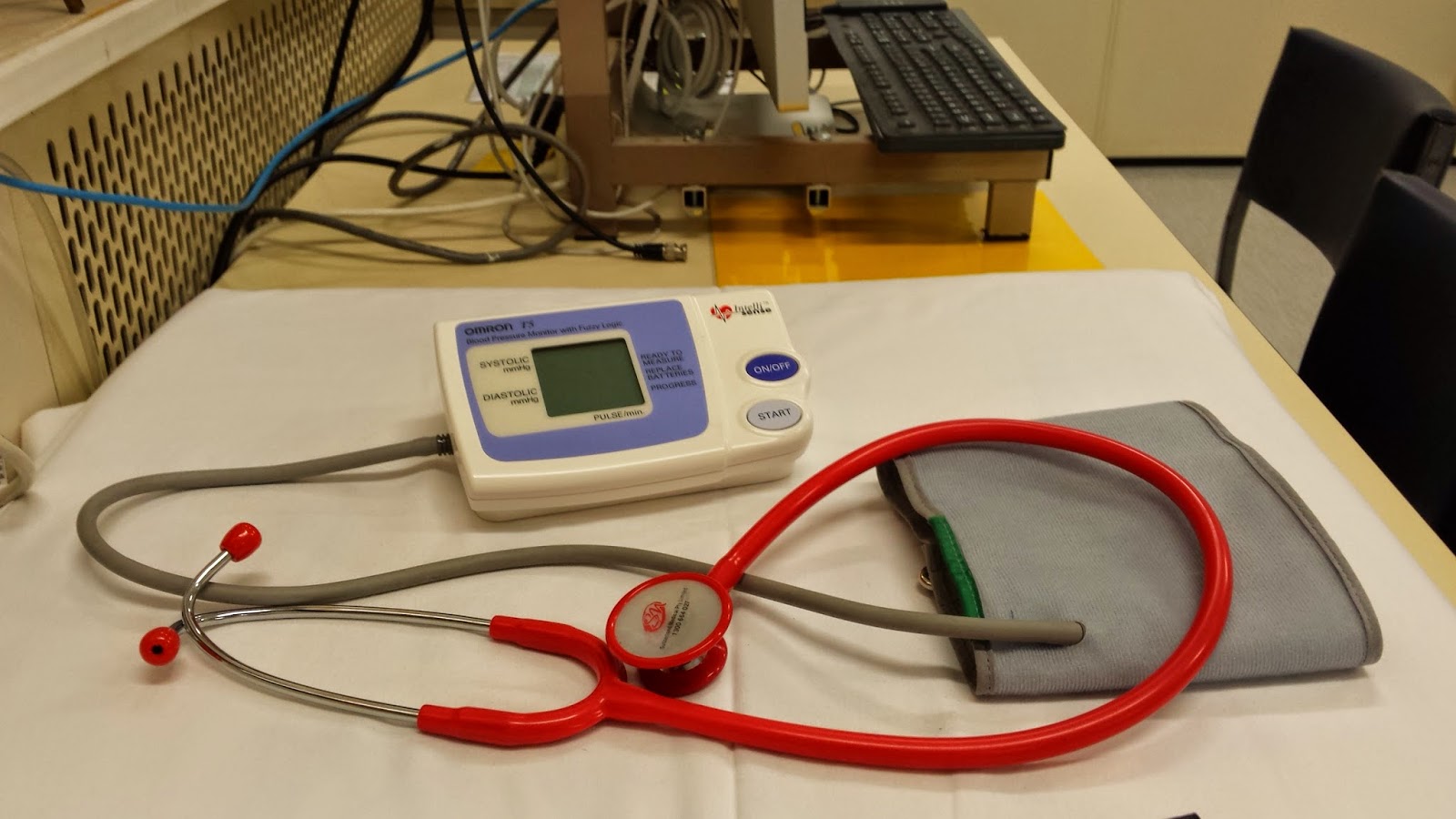
 We begun a new series of physiology lectures on renal (kidney) function. The lecturer utilised clickers to enhance the learning experience (the yellow remote control-like device, left image). This engaged the audience in a 'game-show' of renal physiology MCQs (multi-choice questions). Rather than announcing individual winners, a poll of submitted responses were shown and the actual answer was highlighted. Good fun!
We begun a new series of physiology lectures on renal (kidney) function. The lecturer utilised clickers to enhance the learning experience (the yellow remote control-like device, left image). This engaged the audience in a 'game-show' of renal physiology MCQs (multi-choice questions). Rather than announcing individual winners, a poll of submitted responses were shown and the actual answer was highlighted. Good fun!The last physiology lab looked at the electrical and mechanical events of the heart using ECG, pulse transducers, sphygmomanometer (BP meter) and stethoscopes. As you would expect, the events of the heart adapt to different conditions, so we tried a few different conditions (lying vs standing vs exercise) and discussed the mechanisms behind what we observed. In the right hand image, if you look closely you will see some of my own heart electrical rhythms on the screen (the top line is the ECG recording). ECG leads (and electrodes) require accurate 'placement' (positioning) on clients. The imaginary line between the placed electrodes either side of the heart provides information about that particular plane only. This is why a client may have up to 12 leads placed to provide a more complete picture of what is occurring in the heart.
As if we didn't have enough fun with physiology this week, I dusted off my 'exam kit' for our second mastery test on Wednesday evening. This test covered content about: special senses, respiratory, cardiovascular systems and some neural systems content. Thank goodness this was also MCQ.
The staff at the School of Physiotherapy are very friendly and personable people! A few staff even stop to chat when we happen to see each other around Dunedin / the wider community. One of our lab demonstrators from PHTY254 and PHTY250 (anatomy) seems to have successfully memorised most of the students in our year group!! That's around 100 students, and we are only nearing the end of the first semester - I haven't even said 'hello' to all the students in my year group yet (let alone, know their name by face).
The highlight of my week happened on Thursday - clinical placement! My first physio placement was at the Dunedin Hospital Outpatients Clinic. I have a placement there for the following two weeks too. This is primarily a musculoskeletal service. The placement involved a quick orientation of the physiotherapy outpatient area of the hospital followed by a quick recap of underlying pathology of the knee - and then we had a patient to interview! We were thrown right in to the mix from the get go! As the patient entered the room we were quickly allocated a section of the subjective assessment to take. I was first up. I had to note the 'presenting problem' and fill in the associated body chart. I found this quite difficult, but done an alright job. When I got stuck, my supervisor stepped in to help out. I actually wrote very little on the body chart because I couldn't multi-task. This is certainly something for me to work on next time!!
Tip for surviving physio: have a notebook to document different things you learn/observe, any homework tasks your supervisor gives, and as a resource to notes - like steps of a subjective assessment. Also, it pays to practice assessments on friends and flatmates - physio student's need plenty of 'patient mileage' (practice)!
There are two more weeks until the end of semester one! (I feel like the count-down has begun). So, here are some more song parody clips, but this time they're from medical students. Although med students will eventually provide a different role in the healthcare service, there is a lot of content overlap and we generally have similar attitudes, workloads and interests. These clips have good entertainment value. Enjoy.
It is hard work being a health science student, but there is always time to positively reflect on their experience and enjoy the process.


No comments:
Post a Comment